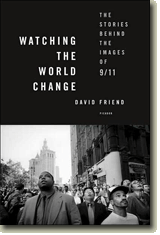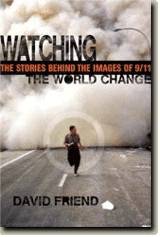« Previous · Home · Next »
May 30, 2007
9/11's RIPPLE EFFECTS
Since my last posting, ten days ago, the ripple effects of the September 11 attacks have been readily apparent across the culture and around the globe.
The New York Times reported that the world’s master builders have grown no less bold in the intervening six years. There are currently two skyscrapers under construction and one on the drawing boards that, when finished, will eclipse the height of the World Trade Center: one in architecturally steroidal Dubai (at 2,650 feet), another in South Korea (twin-spired, 2,013 feet), and, of course, Manhattan’s Freedom Tower.

Also last week Don DeLillo’s new novel, The Falling Man -- which confronts 9/11 through the lives of a handful of survivors, a lone terrorist, and the metaphor of a safety-harness-toting falling-man-in-a-business-suit performance-artist/jumper – was published to generally favorable reviews, most notably Frank Rich’s front-page rave in The New York Times Book Review. (Watching the World Change, in fact, cites DeLillo’s trenchant Harper’s essay from December 2001 in which he called al-Qaeda’s assault an attack on "modernity," on “the white-hot future” and on “the thrust of our technology…our perceived godlessness…the blunt force of our foreign policy…the power of American culture to penetrate every wall, home, life, and mind.”)
And last week President Bush continued to blur the motives of the Iraq debacle with the initial motives that drove a coalition of nations to confront al-Qaeda and the Taliban in Afghanistan. “The enemy in Vietnam,” he said, “had neither the intent nor the capability to strike our homeland. The enemy in Iraq does. Nine-eleven taught us that to protect the American people we must fight the terrorists where they live so that we don’t have to fight them where we live.”
Maureen Dowd, as she’s been wont to do, pointed out the fallacy in this logic. “The president,” she wrote in the Times, “is on a continuous loop of sophistry: We have to push on in Iraq because Al Qaeda is there, even though Al Qaeda is there because we pushed into Iraq. Our troops have to keep dying there because our troops have been dying there. We have to stay so the enemy doesn’t know we’re leaving.”
I’m reminded of the pronouncement of my colleague Christopher Hitchens (author of God is Not Great: How Religion Poisons Everything, the #1 book on this week’s New York Times Bestseller List), who supported the invasion of the Baathist state partly on the grounds of the West’s moral obligation to stand up to despotism. Two years into the war, in a spirited conversation with Christopher, I argued that the war was exponentially minting terrorists, not unlike the bucket-carrying broomsticks in the Sorcerer’s Apprentice fable. His response: Iraq would serve as an al-Qaeda magnet, and all the better. “It’s like the Roach Motel advertisement,” he insisted. “They’ll check in, but they won’t check out.”
Today, that inn, alas, seems more akin to the Bates Motel in Psycho.
Skyscrapers. DeLillo. Bush's closed-loop logic. In terms of 9/11's impact this month, however, first and foremost was the New York City Medical Examiner's controversial yet correct decision to list Felicia Dunn-Jones -- an attorney working near the towers, who died six months after 9/11, due to complications arising from her exposure to hazardous dust -- as the 2,750th Manhattan victim of the attacks.
Instead of arguing whether or not she should have been added to the list, as some have done, we should instead use the designation as a solemn opportunity to pause and remember the 2,749 others as well. To that end, I encourage a visit to Legacy.com.


